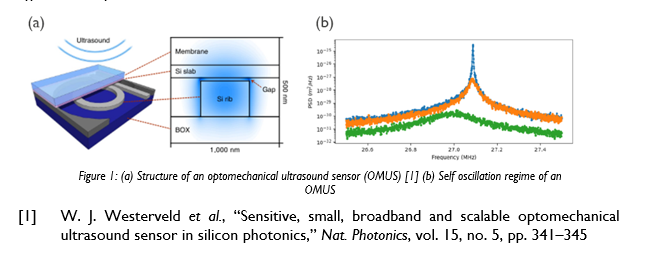Study of the self-oscillation regime in optomechanical microphones
Master projects/internships - Leuven | More than two weeks ago
Explore how to manipulate the mechanical motion of nanostructures via optical forces
Cavity optomechanics investigates the coupling between light and mechanical vibrations. This interaction enables not only the extremely precise readout of the motion of nanostructures, but also allows the manipulation of the mechanical vibrational state of these systems via optical forces. These latter can be used to reduce the amplitude of a resonator’s Brownian motion, or, on the contrary, to amplify it until the self-oscillation regime is reached, in which the mechanical system oscillates in a coherent fashion.
Over the past few years, imec has developed the OMUS optomechanical platform for the fabrication of ultra-sensitive optical microphones, in the context of photoacoustic imaging applications. These devices exhibit large optomechanical coupling factors, which give rise to strong interactions between light and the system’s mechanical degree of freedom, allowing to reach the self-oscillation regime under ambient conditions. Studying these nonlinear optomechanical phenomena will pave the way for the development of various applications such as the fabrication of resonant sensors, time references, and optical frequency combs, on a mature, CMOS-compatible technology platform.
The goal of this internship will be to study theoretically and experimentally the self-oscillation regime of optomechanical microphones. To this end, the student will use the setups available at imec to experimentally characterize these systems and will work on improving the models currently available in the team to describe these phenomena. An application in resonant detection will also be explored.

Type of Project: Combination of internship and thesis
Master's degree: Master of Science; Master of Engineering Technology; Master of Engineering Science
Master program: Physics; Electrotechnics/Electrical Engineering; Nanoscience & Nanotechnology
Duration: up to 1 year
Supervisor: Jan Genoe (EE, Nano)
For more information or application, please contact the supervising scientist Fabrice-Roland Lamberti (fabrice-roland.lamberti@imec.be).
Imec allowance will be provided for students studying at a non-Belgian university.
